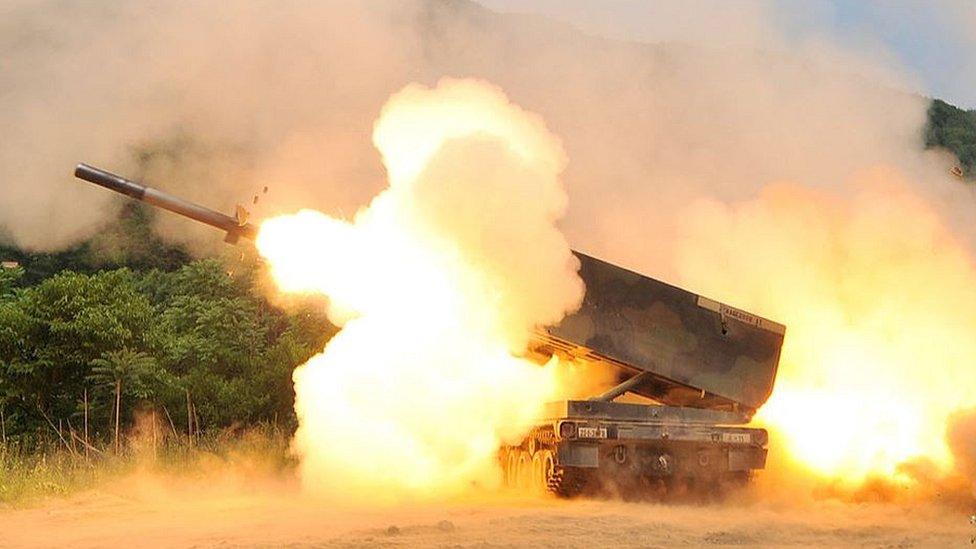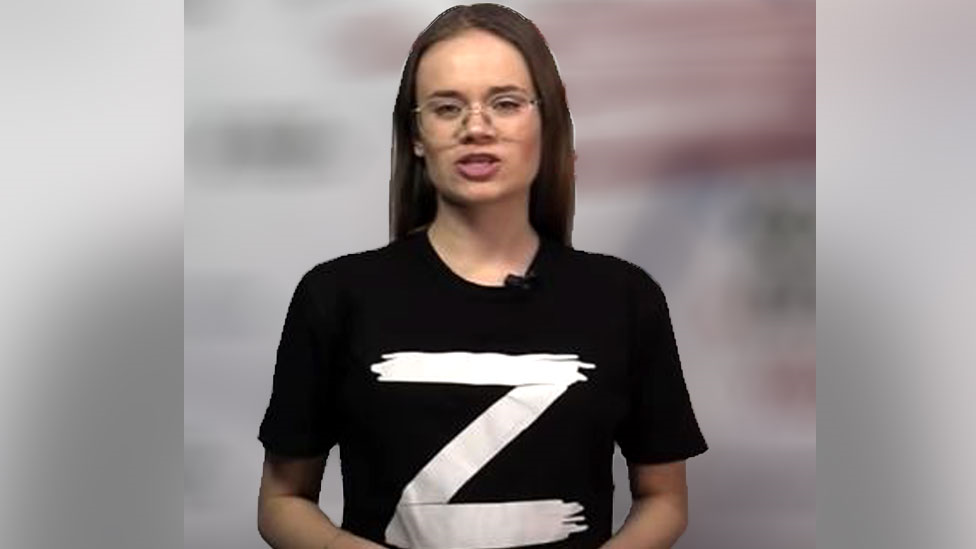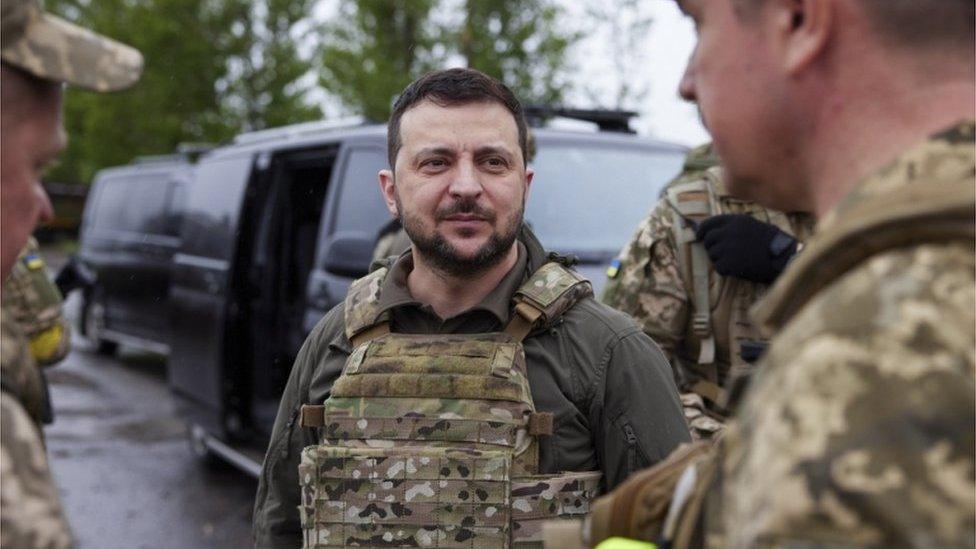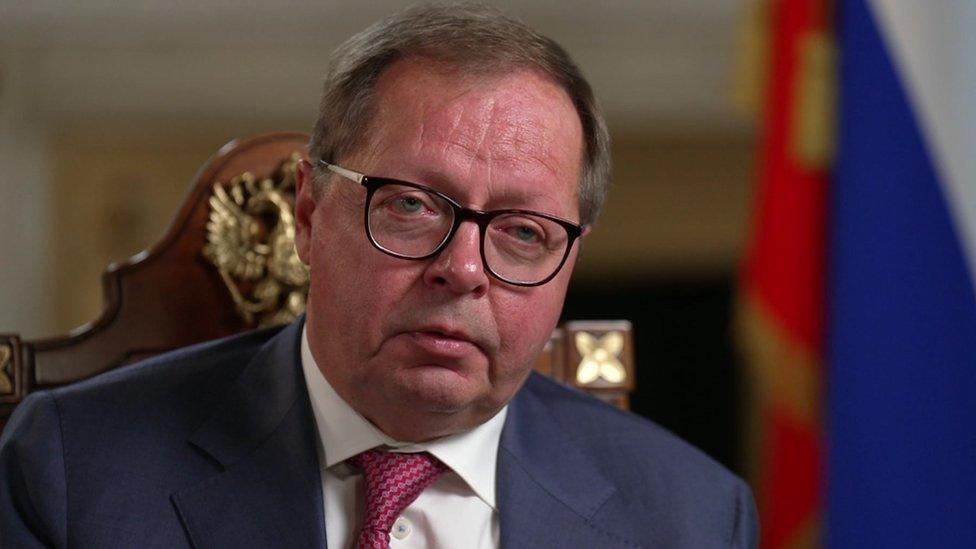Ukraine round-up: Zelensky in Kharkiv and a pro-Putin propaganda machine
- Published
Watch: Ukraine's President Zelensky in Kharkiv, as intense fighting continues in the region
Ukraine's President Volodymyr Zelensky has met troops in the heavily shell-damaged city of Kharkiv - his first official visit to the east of the country since the Russian invasion.
He thanked the troops, handed out medals, and said they were facing an "indescribably difficult" situation.
Russia has resumed shelling Kharkiv, Ukraine's second-largest city, after a fortnight of comparative quiet. The industrial city is 42km (26 miles) from the Russian border.
Mr Zelensky later announced he had fired the head of the Ukraine Security Service in Kharkiv region, Roman Dudin. He accused him of not working on the city's defence.
Ukraine says Russia is still occupying a third of the Kharkiv region. Russian troops have been pushed back from the city's outskirts, but it remains within artillery range.
The heaviest fighting is now south-east of Kharkiv, as Russia uses artillery barrages and air strikes to push the Ukrainians from their remaining strongholds in the Donbas region. Kyiv's forces are putting up stiff resistance.

Long-range US rockets for Ukraine?

American MLRS rockets can hit targets far behind front lines (file pic)
The US government appears close to sending a long-range multiple-rocket system (MLRS) to Ukraine.
Russia sees such deliveries of heavy weapons as a provocative escalation.
President Zelensky and other Ukrainian officials have appealed for the MLRS to counter Russia's offensive in the Donbas.
Kyiv's forces are using US-delivered M777 howitzers, which have a range of about 25km (16 miles). But an M270 MLRS battery can fire rockets at targets up to 300km (186km) distant, as can a similar US rocket system called M142 Himars.
They would greatly boost the Ukrainians' capabilities - even enabling them to hit targets inside Russia, though such action would risk drawing the US and its Nato allies into direct conflict with Russia.
A senior US official quoted by the Washington Post said the White House was comfortable with giving Ukraine the MLRS, but would withhold the longest range rockets compatible with the system.

Ambassador defends Russia's action
Russia's ambassador to the UK, Andrei Kelin, engaged in a terse interview with the BBC's Clive Myrie on the Sunday Morning programme.
He said that Russia would not use tactical nuclear weapons in Ukraine, as it has very strict rules for their use, which apply mainly when the state's existence is threatened.
Asked about civilian killings in the town of Bucha, near Kyiv, he said reports of war crimes there were a "fabrication" orchestrated by the Ukrainian side after Russia's withdrawal.
Satellite imagery appears to directly contradict this position, showing bodies lying in the street nearly two weeks before the Russians left the town.
Read more from the interview: Russia won't use nuclear weapons, says ambassador

Martial arts sisters
Maria and Zlata had to flee their home village of Orikhiv in the south of Ukraine, after the area was bombarded by Russian shells.
The sisters, aged 15 and 10, are world champions in mixed martial arts and are hoping they will still be able to compete for Ukraine, and represent their country at the world championships.
They spoke to the BBC as they tried to keep up their training in Zaporizhzhia, where they are now living.
Watch: Two sisters fled their home in Ukraine, but carried on their martial arts training

The speed of a propaganda operation
A BBC investigation has revealed false and misleading claims by a company called Southern Front, which spreads pro-Putin propaganda across YouTube, social media app Telegram, and through a website targeting areas of Ukraine newly under Russian control.

Pro-Putin network Southern Front deploys the Z symbol expressing support for Russian troops
The news site posted its first message on day one of the Russian invasion of Ukraine, and now has several correspondents filing stories on a daily basis.
The majority of the reports claim to show "peaceful life" has been established in occupied areas. The channel often runs stories that justify Russia's invasion.
Other pro-Kremlin accounts on social media have picked up its stories, spreading them to wider Russian-speaking audiences.
Read our investigation in full here: The making of a new propaganda machine

War in Ukraine: More coverage
MILITARY STATUS: What might swing the Ukraine war?
READ MORE: Full coverage of the crisis, external

Related topics
- Published29 May 2022

- Published29 May 2022

- Published29 May 2022

- Published29 May 2022
